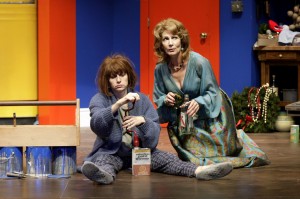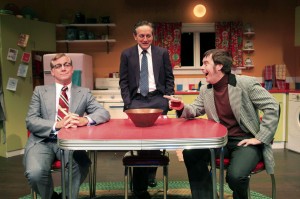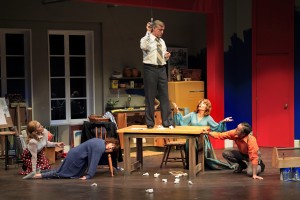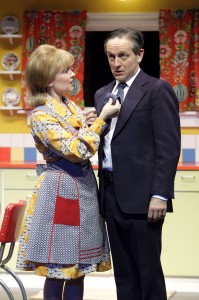LIFE IN THE KITCHEN
Suicide is no laughing matter. No laughing matter, that is, until someone tries to commit it repeatedly in a room full of oblivious friends. Then it’s hilarious. Alan Ayckbourn’s Absurd Person Singular is about three couples, who each in turn throw disastrous Christmas Eve dinner parties at their homes; under David Emmes’ direction at South Caost Rep, the comedy walks a fine line between absurdity and despair. The biggest and best laughs arrive in the first two Acts in which absurdity reigns, but they become muted as despair creeps in during Act III (the intermission occurs after Acts I and II).
Ayckbourn took his original idea for a story set in three different parlor rooms and transposed it to the kitchens. In doing so he brought the backstage life of each couple into the foreground. According to Ayckbourn, “Nowhere in the house says more about a person’s habit and background, the nature of their day-to-day existence, than their kitchen.” Scenic designer Sara Ryung Clement’s rotating stage always keeps one of those kitchens facing the audience. This highlights both the symmetry of Ayckbourn’s vision and the inability of his characters to keep their inner turmoil hidden from public view.
 The kitchen is a place where preparation and transition leave people exposed, and no one in this play is allowed to hide behind his or her pretensions in the parlor room. This is especially evident during Act I’s dinner party in 1970’s England, which takes place in the nearly sterile kitchen of Sidney (J.D. Cullum) and Jane (Kathleen Early), a lower-middle-class couple with social pretensions. All of the characters are repeatedly drawn into the kitchen by their hosts’ lack of preparation for the party. Only the housework-obsessed Jane actually likes spending time in her kitchen, but as a consequence of her forgetfulness and timidity she spends much of the party locked out of it. At this point in the play Sidney’s contempt for his wife is offset by the repeated humiliation he endures while trying to insinuate himself into the professional lives of his social betters.
The kitchen is a place where preparation and transition leave people exposed, and no one in this play is allowed to hide behind his or her pretensions in the parlor room. This is especially evident during Act I’s dinner party in 1970’s England, which takes place in the nearly sterile kitchen of Sidney (J.D. Cullum) and Jane (Kathleen Early), a lower-middle-class couple with social pretensions. All of the characters are repeatedly drawn into the kitchen by their hosts’ lack of preparation for the party. Only the housework-obsessed Jane actually likes spending time in her kitchen, but as a consequence of her forgetfulness and timidity she spends much of the party locked out of it. At this point in the play Sidney’s contempt for his wife is offset by the repeated humiliation he endures while trying to insinuate himself into the professional lives of his social betters.
 Sidney and Jane’s social ineptitude keeps the laughs coming in Act I but the payoff for getting to know these characters arrives in Act II. This Act is set in the kitchen of the architect Geoffrey (Alan Smythe) and his wife Eva (Tessa Auberjonois), a room which has seen better days. The scene opens with a disheveled Eva drinking heavily and writing repeated drafts of what turns out to be a suicide note. Eva remains silent throughout the scene. Geoffrey blathers on about his professional troubles and his repeated infidelities (“I mean, do you really think I enjoy living out my life like some sexual Flying Dutchman?”) until he catches Eva trying to jump out of the fourth-story window and leaves to fetch a doctor. One by one, Eva’s ludicrously unhelpful friends find their way into the kitchen and foil her quest for the ultimate privacy. Ms. Auberjonois becomes the star of the show in a physical sense as well as a theatrical one: her immensely expressive silence is the gravitational force that keeps the rest of the characters in motion. I found my eye drawn to her no matter how extravagant the performances of her fellow actors were, especially the gifted physical comedy of Robert Curtis Brown as successful businessman Ronald.
Sidney and Jane’s social ineptitude keeps the laughs coming in Act I but the payoff for getting to know these characters arrives in Act II. This Act is set in the kitchen of the architect Geoffrey (Alan Smythe) and his wife Eva (Tessa Auberjonois), a room which has seen better days. The scene opens with a disheveled Eva drinking heavily and writing repeated drafts of what turns out to be a suicide note. Eva remains silent throughout the scene. Geoffrey blathers on about his professional troubles and his repeated infidelities (“I mean, do you really think I enjoy living out my life like some sexual Flying Dutchman?”) until he catches Eva trying to jump out of the fourth-story window and leaves to fetch a doctor. One by one, Eva’s ludicrously unhelpful friends find their way into the kitchen and foil her quest for the ultimate privacy. Ms. Auberjonois becomes the star of the show in a physical sense as well as a theatrical one: her immensely expressive silence is the gravitational force that keeps the rest of the characters in motion. I found my eye drawn to her no matter how extravagant the performances of her fellow actors were, especially the gifted physical comedy of Robert Curtis Brown as successful businessman Ronald.
 Eva’s many attempts at suicide, however, are not as morbid as Sidney’s eventual triumph in the professional world. Ronald and Geoffrey’s fortunes fall over the course of the play while Sidney’s rise. Act III opens in Ronald and Marion’s (Colette Kilroy) kitchen with a muted tone. Ronald is hiding from the frigidity of both a home without heat and a wife with a worsening alcohol problem. Geoffrey and a recovered Eva come over to “help” and all of them end up trying to hide from Sidney and Jane, who now delight in playing the role of patrons. Sidney is finally revealed as a diabolical figure standing on a chair wearing a paper crown and shouting, “dance!” to the rest of the characters simply because he can. His friends’ contempt for Sidney’s station in life in Act I was never as visceral as is his hatred of them now.
Eva’s many attempts at suicide, however, are not as morbid as Sidney’s eventual triumph in the professional world. Ronald and Geoffrey’s fortunes fall over the course of the play while Sidney’s rise. Act III opens in Ronald and Marion’s (Colette Kilroy) kitchen with a muted tone. Ronald is hiding from the frigidity of both a home without heat and a wife with a worsening alcohol problem. Geoffrey and a recovered Eva come over to “help” and all of them end up trying to hide from Sidney and Jane, who now delight in playing the role of patrons. Sidney is finally revealed as a diabolical figure standing on a chair wearing a paper crown and shouting, “dance!” to the rest of the characters simply because he can. His friends’ contempt for Sidney’s station in life in Act I was never as visceral as is his hatred of them now.
 The lethargy and sadness of Act III is a structural feature of Ayckbourn’s script. Two of his three couples have fallen on hard times and that lowers the energy level on stage. Eva expresses that her marriage is failing even though she has recovered personally by saying to Geoffrey, “I don’t dislike you, darling. It’s simply that you’re no longer a man I care enough about to throw myself out of a window for.” This biting humor deserves a laugh, but there was a vitality in Eva’s Act II suicide attempt that is now missing. When Sidney and Jane arrive and force life into the party, the shame that the others exhibit while dancing is downright macabre. If you are going to the show for lighthearted laughs, you’ll hit a high point by intermission and may find the last act disappointing. If you enjoy a darker shade of humor, however, and like to contemplate the consequences of failed pretensions, the last portion of the play will be rewarding.
The lethargy and sadness of Act III is a structural feature of Ayckbourn’s script. Two of his three couples have fallen on hard times and that lowers the energy level on stage. Eva expresses that her marriage is failing even though she has recovered personally by saying to Geoffrey, “I don’t dislike you, darling. It’s simply that you’re no longer a man I care enough about to throw myself out of a window for.” This biting humor deserves a laugh, but there was a vitality in Eva’s Act II suicide attempt that is now missing. When Sidney and Jane arrive and force life into the party, the shame that the others exhibit while dancing is downright macabre. If you are going to the show for lighthearted laughs, you’ll hit a high point by intermission and may find the last act disappointing. If you enjoy a darker shade of humor, however, and like to contemplate the consequences of failed pretensions, the last portion of the play will be rewarding.
photos by Henry DiRocco/SCR
Absurd Person Singular
South Coast Repertory in Costa Mesa
scheduled to end on October 7, 2012
for tickets, call (714) 708-5500 or visit http://www.scr.org
